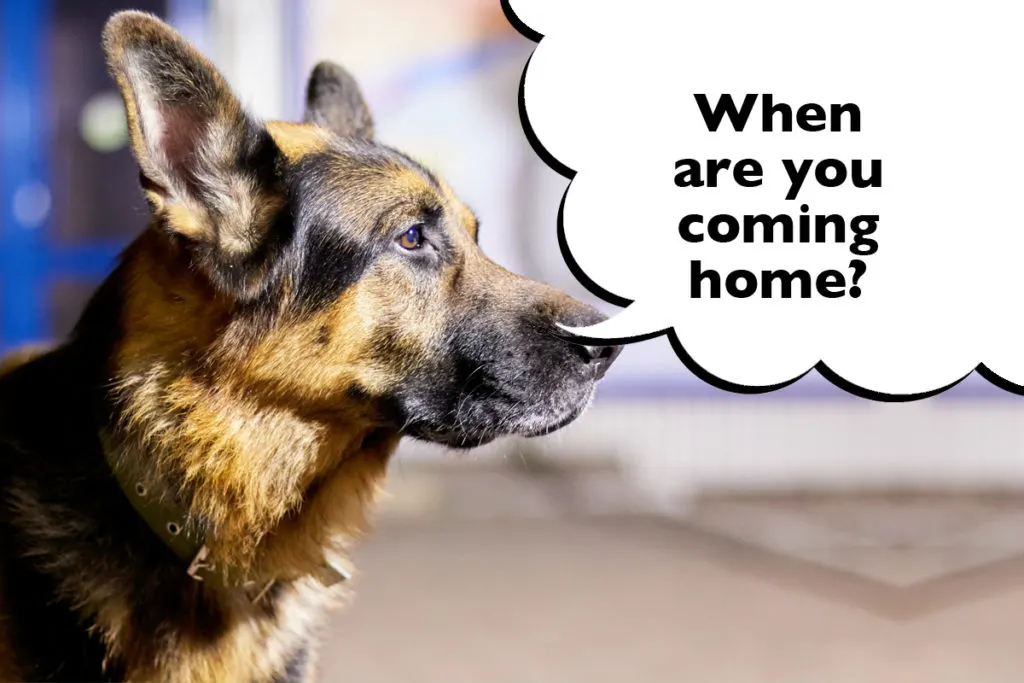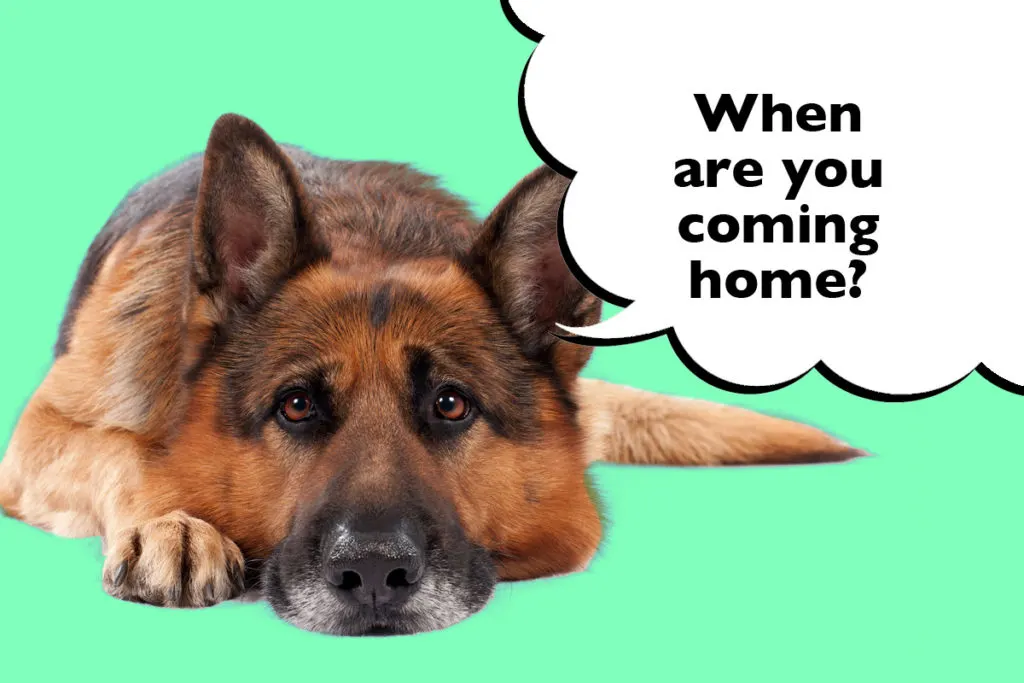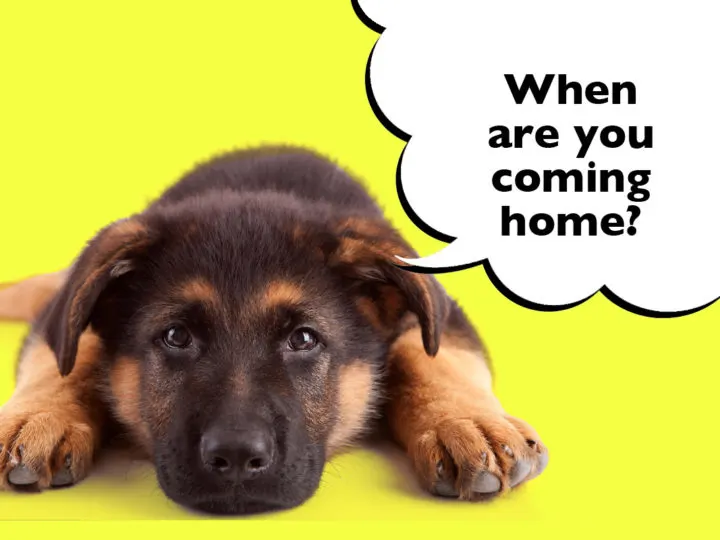Are you concerned your German Shepherd isn’t coping when you’re not at home? Maybe you’ve noticed symptoms of separation anxiety and don’t know what to do? Here’s everything you need to know about German Shepherds and separation anxiety.
Do German Shepherds Get Separation Anxiety? Yes, German Shepherds are prone to suffering from separation anxiety. Originally bred as working dogs, GSDs form strong bonds with the people they live with. They can often become too attached to their owners, leading to issues when they’re left alone.
Read on to find out what separation anxiety is, what signs and symptoms you need to look out for, and for a step-by-step guide on how to treat separation anxiety in German Shepherds.
Never use the advice in this article as a substitute for professional veterinary advice or treatment. I am NOT a Vet, qualified dog trainer or dog behaviourist. This article is based on research, personal opinion and experience of owning dogs over the last 12+ years.
What Is Separation Anxiety In German Shepherds?
German Shepherds have been bred since the late 1800s as working dogs. First as herding dogs for livestock, before gaining popularity as working dogs for the police and armed forces.
These roles require them to form strong bonds with their owner or handler, making it difficult for them to be separated from each other.
Sadly, this can then lead to them developing separation anxiety, which is where they get too attached and don’t cope when left on their own.
The symptoms of separation anxiety can range from mild to severe, but can be quite distressing if it’s not dealt with through consistent dog training.
What Are The Symptoms Of Separation Anxiety In German Shepherds?
If your German Shepherd has separation anxiety, they may show any of the following signs when they’re left alone:
- Vocalising, crying, excessive barking or howling more than usual
- Drooling and panting a lot
- Pacing around the room
- Refusing food or water
- Seeking your attention before you leave them
- Chewing furniture, carpets, cushions etc.
- Having potty accidents in the house despite being house trained
- Eating their own faeces (Coprophagia)
- Destroying items, dog toys, towels, tissues, shoes, raiding bins etc.
- Trying to escape, scratching at doors, windows or walls
- Aggression and destructive behaviours
- Self-mutilation, chewing their feet excessively
How Can I Treat My German Shepherd’s Separation Anxiety?
It’s not always possible to stop separation anxiety completely, but if your German Shepherd is suffering from it, there are some things that may help:
Desensitise Your German Shepherd To Your Leaving Routine
German Shepherds are highly intelligent, so they’ll soon figure out that picking up your keys means you’re about to leave them.
So, the first thing you need to do is work on desensitising them to the triggers of your leaving the house. This is basically the routine you follow just before you go out.
The way to do this is to pick up your keys, put on your shoes, grab your bag (if you normally take one with you) but don’t leave the house.
Just sit down calmly and read a book, watch TV or stick on a YouTube video for 10-15 minutes. Then reward your German Shepherd for staying calm.
Keep doing this several times a day and they’ll soon start to take less notice of you putting your shoes and coat on etc.
Next, get ready to go out but go into the next room. Stay there for a few minutes and then come back to your GSD.
Don’t make any fuss as you do this. Act like it’s no big deal, remain calm and try to play things down.
Then increase the time you stay in the next room until your German Shepherd is comfortable with this too.
Once they seem ok with this, you can then start leaving the house for just a few minutes before coming back to your GSD.
Once this is comfortable for them, you can extend the time slowly.
Building up slowly is a better way to get them used to being left alone. It does take time and patience for this training to work!
However, over time, they’ll soon realise that the sound of your keys doesn’t mean much at all and will stop reacting!

Use Training Aids With Your German Shepherd
Things like pheromone plug-ins and sprays can help your German Shepherd feel more secure. They send reassuring messages which can help them feel more settled.
Thundershirts can also be helpful, they work by applying gentle pressure around your German Shepherd’s body.
This helps them release Oxytocin which can help them feel calmer.
Keep Calm When Leaving Your German Shepherd
German Shepherds are a very attentive breed that pick up on how you’re feeling. If you’re stressed and anxious about leaving them, they’ll notice and it’ll make their anxiety worse.
Instead, keep calm and act as though it’s no big deal that you’re going out without them. The calmer you are, the calmer they will be!
Stick To A Routine With Your German Shepherd
German Shepherds thrive on a structured routine. This way, they know exactly what to expect which can help ease their anxiety.
If you can, leave them at the same time each day so they know this is a normal thing to happen.
This also helps your German Shepherd realise that you’ll always be coming home to them.
Don’t Leave Your German Shepherd For Too Long At Once
Even when your German Shepherd is comfortable being left alone for short periods, it’s important not to push them too far.
Try not to leave them for longer than 4 hours at a time.
If you need to be away for longer than this, ask a dog walker or family member to help you out.
Give Your German Shepherd Something That Smells Of You
Because German Shepherds form such strong bonds with their owners, it can be reassuring for them to smell you when you’re away from them.
If it’s safe to do so, leave them an old item of your clothing in their bed so they feel closer to you.
Just don’t leave anything that could potentially cause them any harm.
Make Sure Your German Shepherd Has A Comfortable Resting Place
Some German Shepherds prefer the security of a crate with a comfy bed inside.
Crates can often help anxious dogs feel more secure, but they must be used responsibly and not for prolonged periods of time.
Others GSDs may prefer the run of the house, or a quiet room to themselves. So go with whichever they’re most comfortable with.
Making sure they feel safe, secure and comfortable is essential to helping them feel relaxed when they’re alone.
Just to be safe, remove anything they might hurt themselves on or anything they could chew up or damage.
Leave Music On For Your German Shepherd
German Shepherds have very sensitive hearing, so they can find it difficult to switch off and relax.
Leaving the radio or TV on low can help create some background noise. This can help drown out any outside noises that may disturb or upset them.
Classical music is a good choice as studies have found it to be the most relaxing for dogs to listen to!
There are even special playlists designed for dogs too!

Use A Camera To Keep An Eye On Your German Shepherd
Cameras give you a better idea of what your German Shepherd is up to when you’re not there. You can also hear if they’re barking and see if they’re distressed.
Some have microphones too, which let you speak to your German Shepherd to reassure them.
However, some dogs can find the sound of you voice unsettling because they can hear you but can’t see you. So it may take a bit of trial and error to see what works best for you.
Exercise Your German Shepherd Before They’re Left Alone
Adult German Shepherds need a minimum of two hours daily exercise. If they’re not getting enough, they’ll have a lot of excess energy and frustration.
This can make it impossible for them to settle down when you leave them at home on their own.
If they’re tired from their walk, it can make it more likely they’ll sleep when you’re away.
Avoid high-intensity exercise though, because this can excite them even more and increase adrenalin levels too!
Use Food Toys To Distract Your German Shepherd
Food toys and puzzles like Kongs, treat balls and long-lasting treats can help distract your German Shepherd while you’re away from them.
Kongs can be filled with dog-safe peanut butter (this must be xylitol free!) or meat paste. Natural treats such as bully sticks or pigs ears can also be great options.
This’ll take their mind off being on their own. Not only this, but it helps create a positive association between the treat or toy and being home alone.
Train Your German Shepherd To Be Independent
German Shepherds have been bred for centuries to work closely with their owner or handler. This can make them reluctant to do things independently without you.
Giving them activities to do which encourage them to be more independent can help.
Hide their favourite toy somewhere in the house and get them to find it. Or give them a snufflemat in a different room so they can forage treats from it.
Building up the time they spend on their own can really help to boost their confidence and lower their anxiety levels.
Be Patient With Your German Shepherd
Helping your German Shepherd overcome their separation anxiety can take a long time.
There will be some days that you’ll make more progress than others, but it’s crucial you’re patient and consistent each day.
Never scold or punish your GSD for behaving in this way as it’s out of their control. They’re not doing it intentionally to be bad, it’s just because they’re feeling anxious and unsure.
The only way to make progress with dog training is through positive reinforcement. Rewarding good behavior and ignoring the bad!
Get Professional Help For Your German Shepherd
If your German Shepherd’s separation anxiety is very severe, then you may need to seek help from a canine behaviourist and your vet.
They’ll be able to recommend medication that can be used short term to help your GSD while you work on resolving the issue.
So, there you have it! It’s common for German Shepherds to suffer from separation anxiety. They’re an extremely loving and loyal breed, but the strong bond they share with their owners can lead to issues when they’re left alone. However, by desensitising them to the triggers of you leaving the house and slowly building up the time you’re away, you can train your GSD to overcome this!
What do I do next?
Thank you for reading all the way to the end of this article, your support for my blog means everything to me! If you found this article helpful, please kindly share below. Thank you!

